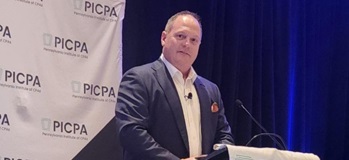Summer 2025
Features
Keeping It Public: Navigating the Nonprofit Public Support Test
By Harrison A. Pereira, CPA
For nonprofit organizations to enjoy tax-exempt status under Section 501(c)(3) of the Internal Revenue Code, these organizations must adhere to certain requirements and regulations. One such requirement is the public support test, and nonprofits risk losing their public charity status and become taxable foundations if this requirement is not carefully monitored.
Is Remote Work Stifling Vital Skills for Leadership?
By Sarah G. Boyle and Ashley Stampone, CPA, PhD
Virtual and hybrid work has made demonstrating and developing interpersonal skills more difficult. The growth of this workplace emotional intelligence is particularly critical for younger generations of workers. This feature highlights the emotional intelligence skills that workers and employers should be focused on developing.
Columns

Accounting & Assurance
Monumental Move: Financial Statements Outside Accounting and Review Standards
By James J. Newhard, CPA
SSARS No. 27, Applicability of AR-C Section 70 to Financial Statements Prepared as Part of a Consulting Services Engagement, may well be the shortest SSARS ever issued, but its impact could be enormous. In essence, the standard finally permits the “plain paper financial statement” service.

CPA Advocacy
Forward Together: Stonesifer’s Plan for Pennsylvania CPAs
By David Stonesifer
As David Stonesifer began his year as 2025-2026 president of the PICPA, he shared a message to all members. Among his plans, he has placed an emphasis on the modernization efforts to address the talent shortage facing the profession and championing our proposed legislation that creates an alternative licensure pathway for prospective CPAs.

Legislative News
Pennsylvania Budget Negotiations: Key Issues and Political Hurdles
By Peter N. Calcara
With a politically divided state government – Democratic Gov. Josh Shapiro, a narrowly Democratic-controlled House, and a Republican-led Senate – the budget battle in early summer was a tug-of-war over spending priorities, tax policy, and structural reforms. This column explains the issues being debated this summer as Pennsylvania lawmakers embarked on their final push of the fiscal year 2025-2026 budget cycle.

Employee Benefit Plans
When Plan Administrators Cross Paths with a Natural Disaster
By Joanne Szupka, CPA
When it comes to managing the daily operation of an employee benefit plan, often outside professionals (trustee/custodian, recordkeeper, third-party administrators) are hired. But this “outside” connection and certain filing deadlines can get tricky when there is a federal disaster determination at either the plan’s locale or that of a third-party provider.

Business Transformations
Section 280G: Navigating the Golden Parachute Conundrum
By James P. Swanick, CPA, and Michael J. Tighe, CPA
Section 280G of the Internal Revenue Code, often referred to as the "golden parachute" provision, is intended to prevent undue enrichment. But with proper planning and coordination between a corporation and its shareholders, there are ways to soften the sometimes very stringent implications of Section 280G.

Business & Industry
Don’t Discount Relationship-Building in CFO Success
By Rob Berkebile, CPA
The true test of a CFO’s ability to lead isn’t necessarily the strength of one’s knowledge, but rather the strength of one’s relationships. And the glue that holds relationships together is trust; it is the currency that is earned and exchanged in any relationship.

Liability Lessons
Tech Scam Risk Management
By Wilhelm Dingler
Instances of phishing, smishing, spear phishing, and social media scams are proliferating on the internet and through various forms of electronic connections. This column explores some of the challenges faced by accountants and provides some risk-management suggestions for how to deal with them.

Personal Financial Planning
When Breaking Up with the Keystone State, Changing Domicile Is a Multifactor Process
By Brian M. Balduzzi, JD, LLM (Taxation), CFP
When it comes to tax management, changing one’s home is more complicated than simply starting mail forwarding. Establishing domicile in a new state is a multistep process, and one that is particularly important if a client’s income tax liability could linger in the former jurisdiction.

Forensic Accounting
Toying with Fraud, Playing with Consequences
By Allison Greenfield, CPA, CFE, and Marion Wickersham, CPA, MS-FFE, CFE
This column looks at corporate fraud and the importance of strong governance and ethical practices through the lens of the toy industry.

International Tax
Foreign Tax Creditable Against Net Investment Income Tax
By Andrew M. Bernard Jr., CPA, MST
Section 27 of the Internal Revenue Code does not permit a foreign tax credit (FTC) against the net investment income tax (NIIT). But the Court of Federal Claims recently held that FTCs are creditable against a taxpayer’s NIIT under certain income tax treaties. That the decision may represents a significant opportunity for those who pay income taxes to countries that have an income tax treaty with the United States on income subject to the NIIT.

State & Local Tax
SALT Practitioners: Unsung Heroes with High Growth Potential
By Matthew D. Melinson, CPA, and Dylan Diodato, CPA
State and local tax professionals often wrestle with complex tax matters that are sometimes overlooked in favor of federal tax issues or the immediate concerns of a business. Given the growing fiscal impact and importance of state and local taxes, these experts are becoming increasingly valued and recognized for their contributions.



